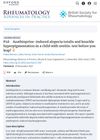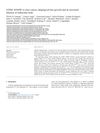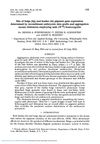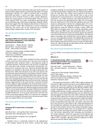15 citations,
February 2014 in “PloS one” LIPH mutations in Japan cause varying degrees of hair loss and woolly hair.
3 citations,
August 2021 in “Clinical Case Reports” Genetic testing is crucial before giving azathioprine to avoid severe side effects.
65 citations,
September 2014 in “Orphanet Journal of Rare Diseases” Different STUB1 gene mutations cause varied symptoms in autosomal recessive ataxias.
 97 citations,
March 2002 in “Molecular and cellular biology”
97 citations,
March 2002 in “Molecular and cellular biology” Mutant CDP/Cux protein causes hair defects and reduced male fertility in mice.
 September 2016 in “Journal of Dermatological Science”
September 2016 in “Journal of Dermatological Science” The protein aPKCλ is crucial for keeping hair follicle stem cells inactive and for hair growth and regeneration.
 6 citations,
February 2013 in “Medical Oncology”
6 citations,
February 2013 in “Medical Oncology” Certain genetic variants increase the risk of resistance to hormone therapy in prostate cancer patients.
 1 citations,
February 2013 in “Clinical pediatrics”
1 citations,
February 2013 in “Clinical pediatrics” The baby’s hair loss was due to a rare genetic condition, not treatable by usual methods.
42 citations,
July 2013 in “Gene” IL-4 gene variation may increase the risk of alopecia areata in Turkish people.
 134 citations,
June 2005 in “Neuropsychopharmacology”
134 citations,
June 2005 in “Neuropsychopharmacology” GABRA2 gene variations impact alcohol response, and hair loss medication finasteride reduces some effects.
 November 2024 in “Rheumatology Advances in Practice”
November 2024 in “Rheumatology Advances in Practice” Monitor for early signs of azathioprine toxicity and check blood counts regularly.
 July 2022 in “The journal of investigative dermatology/Journal of investigative dermatology”
July 2022 in “The journal of investigative dermatology/Journal of investigative dermatology” A patient with a PLEC mutation has epidermolysis bullosa, muscular dystrophy, and myasthenia gravis, which improved with steroid treatment.
 4 citations,
January 2017 in “Journal of pediatric endocrinology & metabolism/Journal of pediatric endocrinology and metabolism”
4 citations,
January 2017 in “Journal of pediatric endocrinology & metabolism/Journal of pediatric endocrinology and metabolism” Two different mutations in the vitamin D receptor gene cause different symptoms and responses to treatment in Lebanese patients with hereditary rickets.
 14 citations,
July 2010 in “British Journal of Dermatology”
14 citations,
July 2010 in “British Journal of Dermatology” Estrogen and prolactin may play bigger roles in female hair loss than previously thought.
8 citations,
March 2010 in “The journal of investigative dermatology/Journal of investigative dermatology” The 14-3-3σ gene is essential for preventing hair loss.

Not having the gene PLAAT3 leads to fat loss, high insulin resistance, and abnormal fat levels in the blood due to a disruption in fat cell development and function.
 9 citations,
November 2019 in “Cell calcium”
9 citations,
November 2019 in “Cell calcium” The STIM1 R304W mutation in mice leads to bone changes and teeth hair growth.
 7 citations,
September 2017 in “Scientific Reports”
7 citations,
September 2017 in “Scientific Reports” Mice with too much sPLA₂-IIA have hair loss and poor wound healing due to abnormal hair growth and stem cell depletion.
 7 citations,
October 1985 in “Genetics Research”
7 citations,
October 1985 in “Genetics Research” Beige and leaden pigment genes act within melanocytes, affecting pigment patterns.
 7 citations,
June 2016 in “Bone Research”
7 citations,
June 2016 in “Bone Research” A Chinese family had a child with a specific gene mutation causing vitamin D-resistant rickets, but the child improved with calcium and low-dose calcitriol.
 February 2019 in “bioRxiv (Cold Spring Harbor Laboratory)”
February 2019 in “bioRxiv (Cold Spring Harbor Laboratory)” The gene Prss53 affects hair shape and bone development in rabbits.
 September 2019 in “The journal of investigative dermatology/Journal of investigative dermatology”
September 2019 in “The journal of investigative dermatology/Journal of investigative dermatology” Not having enough cystatin M/E protein causes less hair growth and dry skin.
1 citations,
September 2021 in “Frontiers in genetics” A genetic mutation in the DCAF17 gene caused Woodhouse-Sakati syndrome in a Chinese patient from a related family.
 81 citations,
July 2008 in “The Journal of Clinical Endocrinology and Metabolism”
81 citations,
July 2008 in “The Journal of Clinical Endocrinology and Metabolism” Certain mutations in the H6PD gene cause Cortisone Reductase Deficiency by affecting hormone production.
7 citations,
February 2019 in “Veterinary medicine and science” An American Bully with a genetic skin condition improved significantly with specific topical treatments.
 14 citations,
September 2018 in “The journal of allergy and clinical immunology/Journal of allergy and clinical immunology/The journal of allergy and clinical immunology”
14 citations,
September 2018 in “The journal of allergy and clinical immunology/Journal of allergy and clinical immunology/The journal of allergy and clinical immunology” A boy's growth and immune problems were caused by a new mutation in the STAT5B gene.
21 citations,
June 2009 in “Mammalian genome” A new mutation in the Hr gene causes hair loss in mice, similar to a human hair disorder.

The CD4 protein may play a role in the behavior of certain skin cells, affecting their growth, movement, and differentiation.
 9 citations,
March 2018 in “European journal of dermatology/EJD. European journal of dermatology”
9 citations,
March 2018 in “European journal of dermatology/EJD. European journal of dermatology” A new mutation in the ST14 gene causes a rare skin and hair disorder in a specific family.
8 citations,
December 2016 in “Hormone Research in Paediatrics” Tunisian children with hereditary vitamin D-resistant rickets showed improvement with calcium treatment, and new genetic mutations were identified.
 September 2016 in “Journal of Dermatological Science”
September 2016 in “Journal of Dermatological Science” A specific mutation known for causing cancer is also found to cause a skin condition in a young girl.




















